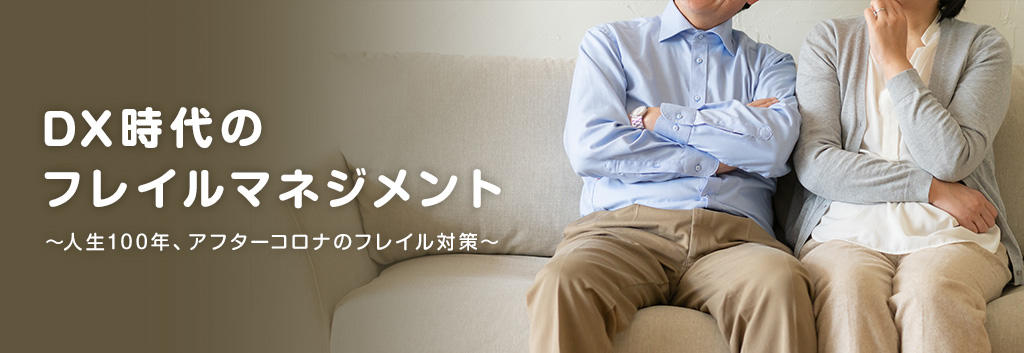
フレイルとは、健康な状態と要介護状態の中間に位置し、身体的機能や認知機能の低下が見られる状態のことを指します。コロナ禍の自粛によりフレイルは急拡大していますが、その実態とリスクはまだ広く知られていません。九州大学、熊谷名誉教授はフレイル疫学研究を通して対策メソッドとエビデンスを導き出しました。前半はフレイルの正しく認識すること、後半は時間・空間の壁を超えるアンチフレイル・デジタルソリューションについて触れていきます。
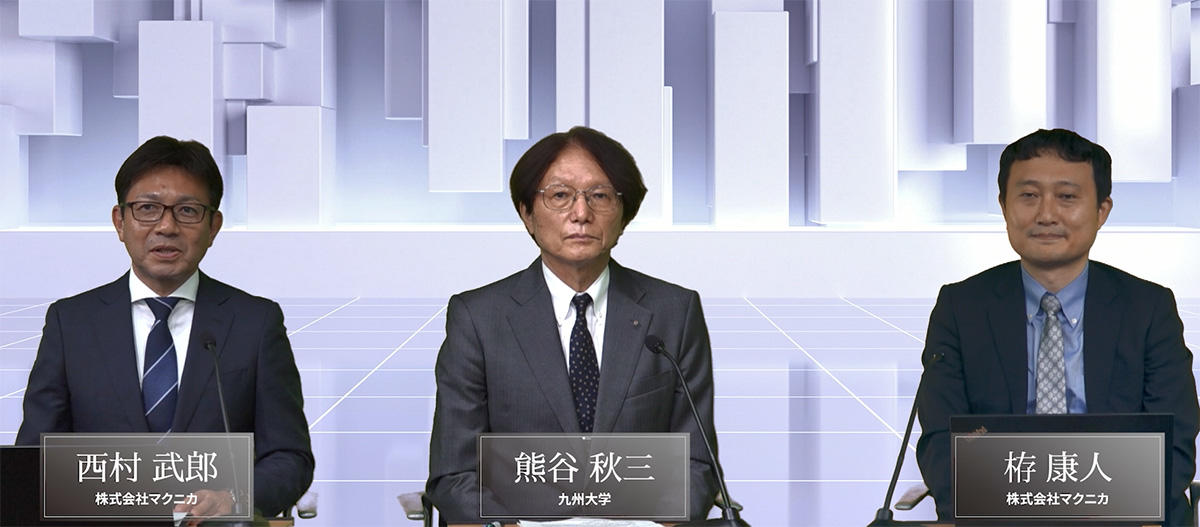
(左から、マクニカ 西村、九州大学 熊谷様、マクニカ 栫)
フレイル研究のトップランナーの指導に基づいたマクニカの試み
内閣府の発表によると、日本は総人口1億2,571万人(2021年)のうち、65歳以上人口が3,619万人、総人口に占める割合(高齢化率)は28.8%です。
今後、総人口が減少する中で高齢化率は上昇を続け、2036年には33.3%、2065年には38.4%に達するとされています。
こうした状況からも、65歳といわず60歳前後から、自治体や医療機関などによる健康維持のための指導を国全体で進めていく必要があります。そしてそれを支えるヘルスケア分野のテクノロジーの進展も大きく期待されています。
マクニカは、社会課題の解決にビジネスチャンスの芽があると考え、ヘルスケア分野のビジネスにも進出しています。特に高齢者向けのソリューションでは、「フレイルに関する疫学研究分野」のトップランナーである九州大学名誉教授 熊谷秋三先生とタッグを組み、新しい取り組みを開始しました。
厚生労働省はフレイルを「年をとって体や心のはたらき、社会的つながりが弱くなった状態」とし、「高齢者のフレイル予防事業」を進めています。フレイルは要介護の手前の段階とされ、放置すると健康な状態に戻ることが非常に難しくなります。加齢などの影響でフレイル状態になった初期段階を「プレフレイル」と呼び、プレフレイルの段階に早期に状態把握をして、運動や食事など生活改善を行うことが重要です。
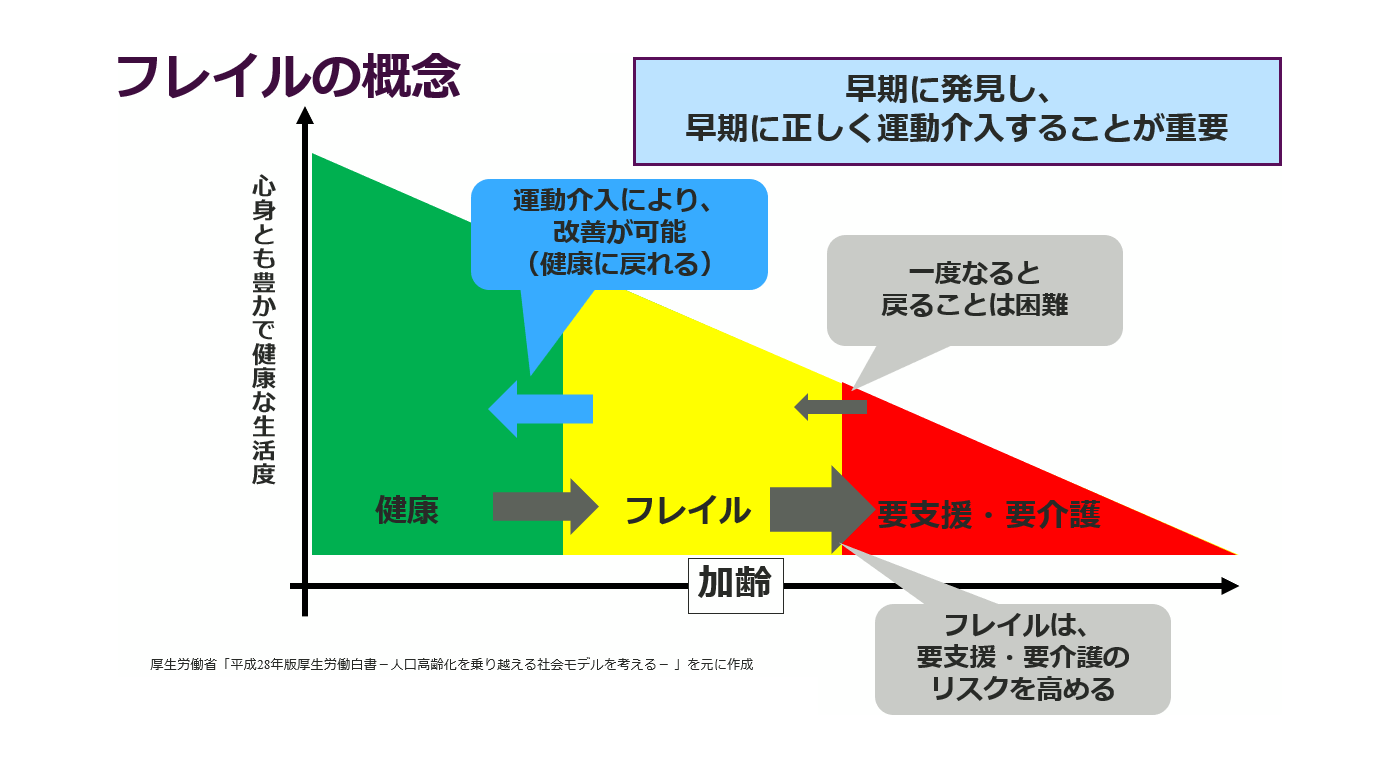
熊谷先生は、福岡県糸島市や同糟屋郡篠栗町、また全国の複数の自治体などで、フレイルに関する疫学調査を行ってきました。その成果の1つとして、簡易フレイルチェックシート(FFPQ)を開発しました。このシートは従来25項目の質問でフレイルかどうかを判断していたものを、有効性を維持しながら、6項目に減らしたものです。
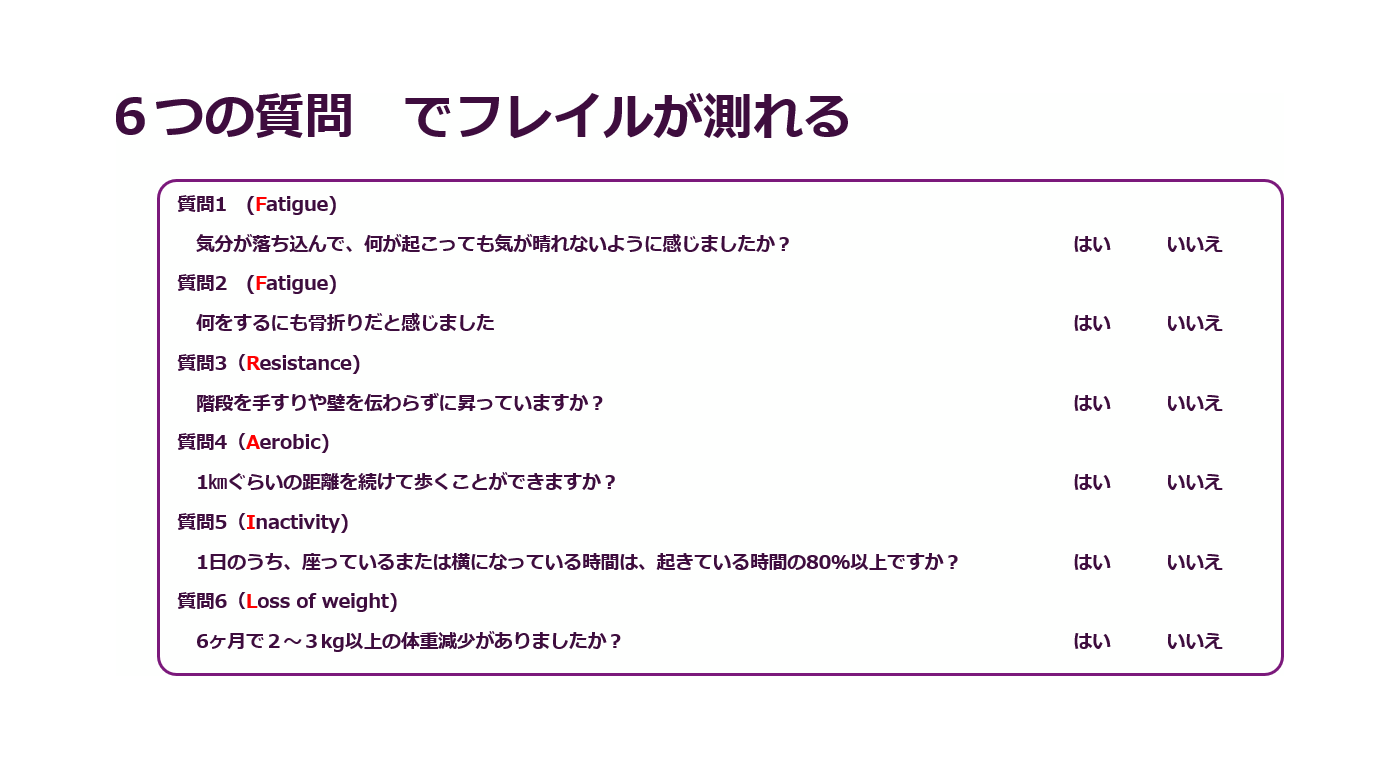
簡易フレイルチェックシートは、熊谷先生のグループによる地道な調査研究から、疫学的なエビデンスに基づいて作成されました。25項目から6項目に減らしても、65~74歳の高齢者のフレイル判定が正確に実行できることが証明されています。
6項目に減らせたことで、チェックシートを試しやすくなり、さらに調査の時間も減らすことができるうえ、データを効率的に集めることができます。さらには、データ化して分析を行う際にも、より負担が軽減できます。
フレイルは早期発見と運動によって予防が可能
熊谷先生の研究は数千人単位の高齢者を対象に、6~9年の時間をかけて、単純にデータを採取し続けるだけでなく、対象者に運動指導なども実際に行うことで、多くの高齢者の健康維持にも貢献しています。
これまでの調査研究の成果として、フレイルは要介護認定率の危険因子であり、中高強度身体活動(少し息が弾む程度の運動)を継続することで、フレイルが進行していくリスクは低下する可能性が高いことが分かっています。つまりフレイルかどうかを判定できれば、その後の要介護認定のリスクを低下させることができ、介護に関連する社会コストの増大や高齢者のQOL低下を防ぐことにもつながるというわけです。
さらに体力・運動機能は、総・原因別死亡率および認知症発症のリスク因子であることも判明しており、フレイル予防のための中高強度身体活動を1日60分程度続けると、高齢者にとっての様々なリスクを軽減させることが分かってきています。
熊谷先生によるとこれまでの調査から、高齢者の約半数近くがフレイル、もしくはプレフレイル状態にあります。しかし65歳から75歳を対象にした調査では、運動指導などによって4割から5割の人がフレイル状態から脱することができたと判明しています。
コロナ禍でのフレイル改善のための運動
要介護認定率の危険因子であるフレイル改善するには運動の指導が大きく影響します。しかし、コロナ禍においては指導法にも工夫が必要です。
熊谷先生のコロナ禍における調査研究では、新型コロナウイルス感染者のフレイル出現率は45%ということが分かっています。つまり新型コロナウイルスに感染した高齢者の2人に1人はフレイルになるということです。
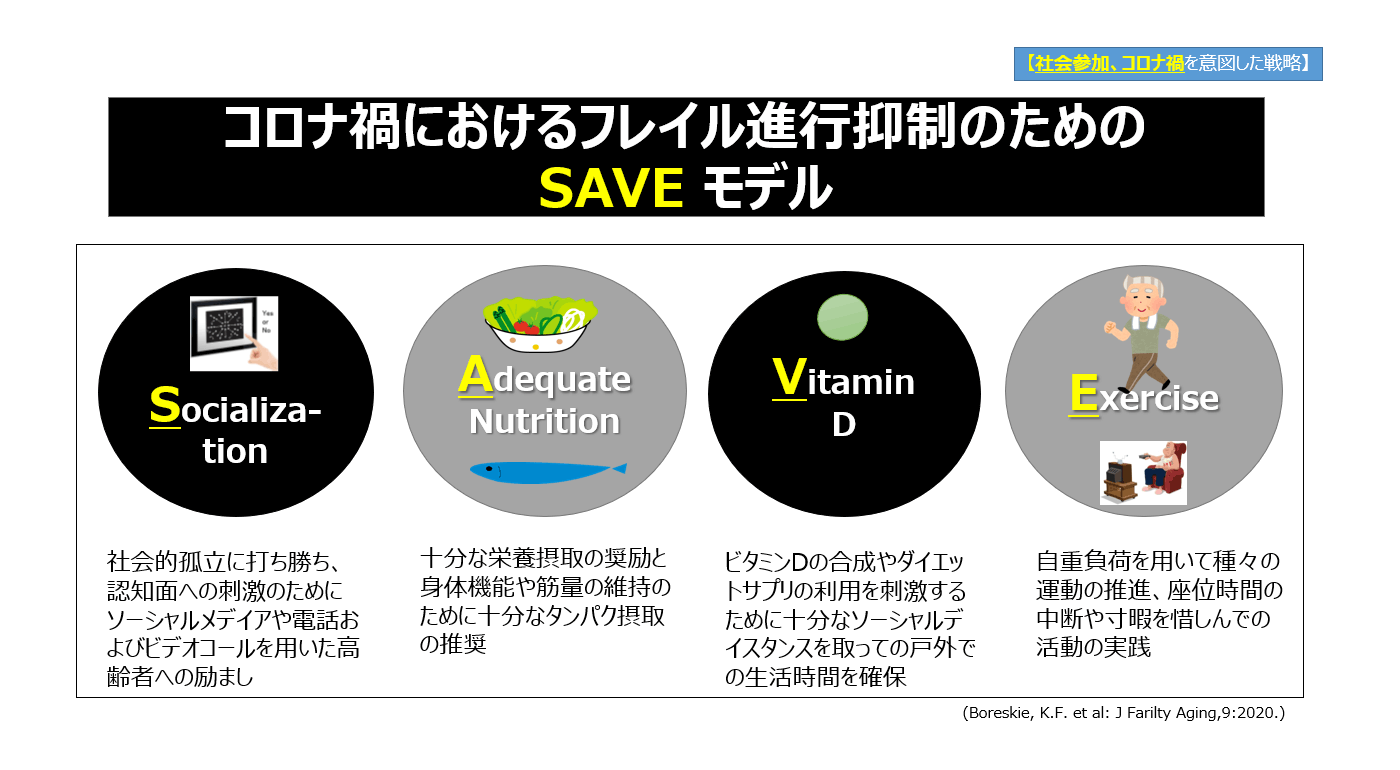
こうしたことを防ぐためにもコロナ禍であっても、感染対策を施したうえでフレイル予防の指導が求められています。熊谷先生のグループでは、「コロナ禍におけるフレイル進行抑制のためのSAVE モデル」を設定し、高齢者が運動を継続できる環境を整えるための指針を策定しました。
このモデルの実践には、ICTを活用した「遠隔指導」の環境が欠かせません。また対面、遠隔いずれの場合にも、指導したその日だけでなく、継続して運動を行っているかどうかのモニタリングシステムも必要となります。また多様な計測機器・センサーを利用しながら運動していない時間の状態も把握したうえで、社会的に孤立せず、コロナ感染も起こさない環境づくりが最終的には求められていくでしょう。
熊谷先生の研究において、日常的な運動がコロナ感染の重症化を防ぐ効果があることがわかっており、ICTを活用したモニタリング環境および、公衆衛生におけるデータ収集・解析環境が今後ますます重要さを増していくことになります。
高齢者および家族のQOLを低下させないための環境づくりとは
高齢者および家族のQOLを維持するためには、コロナ禍での対策も大切ですが、それだけでなく、日常生活の不安や痛みを軽減し、高齢者が自立できる時間を増やすことが重要です。熊谷先生は、フレイル対策がこうしたニーズに大いに応えるものになると指摘します。
「フレイルチェック、運動介入・指導、フレイル再チェックというサイクルをシステム化、リモート化させることで、高齢者への具体的なサポートを強化すると同時に、さまざまなデータが蓄積されることで、新たな知見を生み出す可能性を大幅に高めることができます」(熊谷氏)
そうした体制の確立には、自治体の協力が欠かせません。健康状態などの機微な情報を大量に取得し分析を行っていくには、各自治体がフレイルの把握がしやすい環境を利用することが必須となります。さらに、コロナ禍が落ち着いた状況であれば、リモートよりも対面の指導が優先さていくかもしれませんが、今後、再び厳しい感染状況が全国で発生することも想定されます。そのような事態となっても、外部環境に左右されずに、高齢者が健康増進を実行していける環境が必要ですし、感染拡大を防ぐ手段にもなるはずです。
マクニカのフレイル予防サービス
マクニカのフレイル予防サービスは、「初回スクリーニングサービス」を無償で提供しており、この環境づくりに大いに貢献できると考えます。
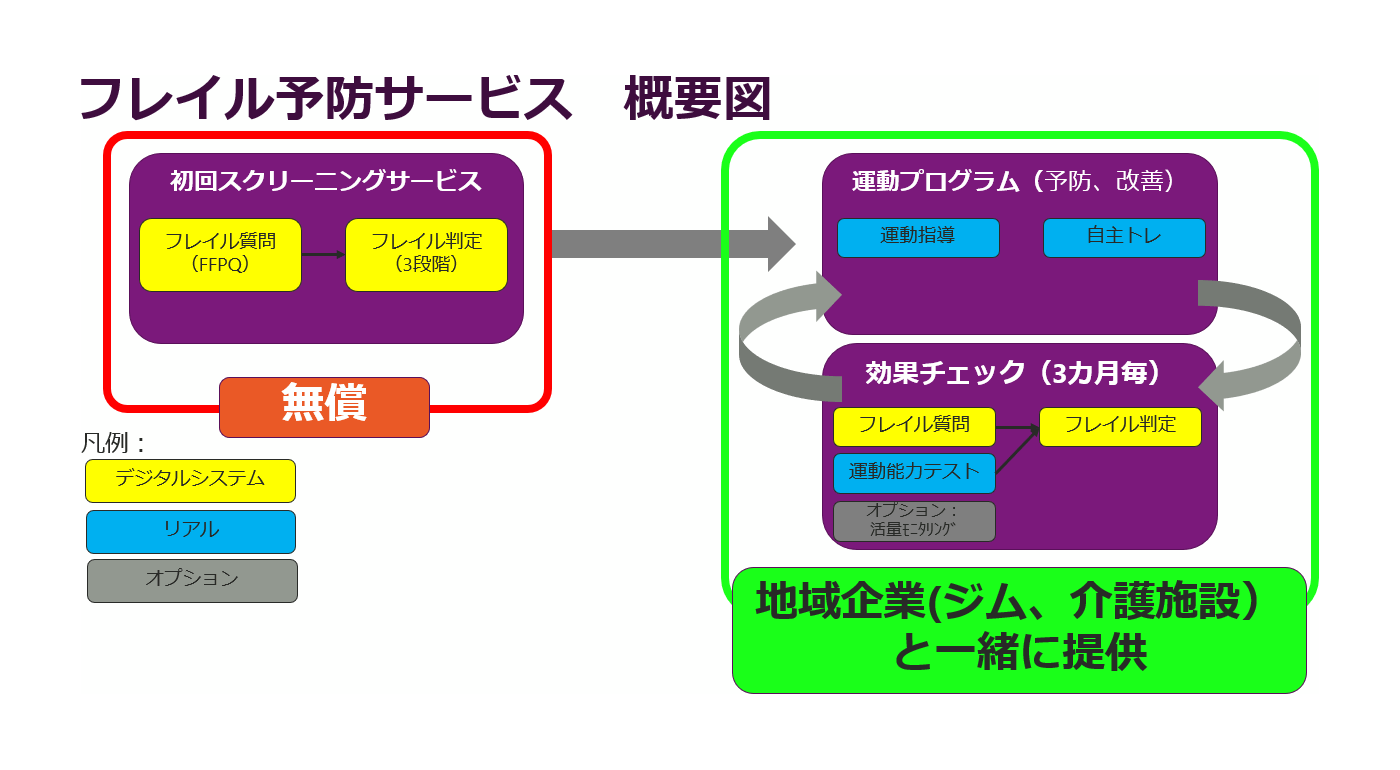
自治体などの公共機関が手軽にフレイルの把握ができるようになることで、ジム、介護施設などの地域企業などとともに、熊谷先生が構想する、最初の把握以降の「運動介入・指導、フレイル再チェック」というサイクルをまわしていくことが可能となり、運動能力のテストや効果測定を行うことで、より広く、詳細にデータを収集し、分析していくことも可能となります。
マクニカでは、無償サービスを利用する自治体とともに、運動介入・指導、フレイル再チェックをマクニカとともに行ってくれるパートナーも募集しています。
ここまで述べてきたように、フレイル予防は、従来の介護ビジネスにパラダイムシフトを起こす可能性があります。これまで要介護認定となるまで問題が発見されず、生活改善が進められなかった高齢者の多くが、フレイルという概念によって、不可逆的な介護対象者になるまえに回復し、自立して生活できる方が増えていくためです。
また、今後マクニカがこの取り組みに参画していくことで、膨大なデータを低コストで取集、管理し、素早く分析できるようになり、エビデンスのしっかり保証された医学的アプローチが可能となります。こうした流れができれば、効果的な指導がすぐに医療機関や介護施設などで実施され、高齢者自身も積極的にチャレンジすることになるでしょう。
フレイル予防サービス詳細はこちら
https://www.macnica.co.jp/business/healthcare/products/139590/
